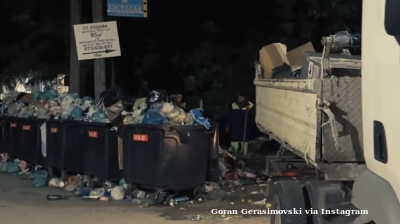US Defence Secretary Jim Mattis accused Moscow on September 17 of trying to influence Macedonia’s upcoming referendum on the name deal with Greece with the aim of preventing the country’s accession into Nato.
Russia is openly against the accession of more countries from the Western Balkans into Nato, with the country’s foreign ministry claiming July 12 that Macedonia was being "pulled into Nato by force" and that such moves do not strengthen security, but deepen divisions and tensions in Europe.
Mattis was cited by international media as saying that Moscow is funding pro-Russian groups to influence the outcome of the referendum due to take place on September 30. A yes vote in the referendum will allow the deal with Greece to go ahead, which in turn will unblock Macedonia's EU and Nato integration processes.
“They have transferred money, and they’re also conducting broader influence campaigns,” Mattis was quoted as saying.
Mattis gave the statement to journalists travelling with him to Skopje, where he had a joint news conference with Prime Minister Zoran Zaev and Defence Minister Radmila Sekerinska, although in the Macedonian capital he did not mention anything about Russian influence.
For or against?
The referendum is a crucial step in the implementation of the name deal with Greece. The question that will be posed in the referendum is: Are you for EU and Nato integration by accepting the deal between the Republic of Macedonia and Republic of Greece?
Greece, a Nato member, blocked Macedonia’s bid to join Nato at the Bucharest summit in 2008 due to the unresolved dispute between the two countries. Athens objects to the use of the name Macedonia as it has a province with the same name in the north.
Under the deal Macedonia has agreed to change its name to North Macedonia, for which it needs constitutional changes. Part of the population is against such changes.
According to the Macedonian government statement, Mattis praised the historic name deal signed in Prespes, saying that it will open the door for Macedonia to become the 30th member of Nato.
Nato invited Macedonia to become a member on July 12 on the condition it implements the name deal with Greece.
Mattis’ visit was also intended to support Macedonia during its expected Nato accession, and to reiterate the continued US commitment to peace and security in the region. This was the first visit of a US defence secretary to Macedonia in the last 14 years.
In Skopje, Mattis also said the US plans to expand cybersecurity cooperation to thwart malicious cyber activity that threatens both countries.
Mattis was the latest of a series of Western leaders, including Nato secretary general Jens Stoltenberg and German Chancellor Angela Merkel, to visit Macedonia to urge people to support the name agreement.
Zaev said at the news conference that for Macedonia, there is no alternative to Nato and EU integration, which he said is confirmed by the vast majority of citizens.
The main opposition party, VMRO-DPMNE, does not support the name deal, even while saying it is for Nato and EU integration. It claims that the agreement is harmful and against the country’s national interests. However, its leader Hristijan Mickoski did not openly urge people to boycott the referendum, but said they should vote according to their consciences.
In Skopje, Mattis also met Macedonian President Gjorge Ivanov, who is close to VMRO-DPMNE and is against the name deal.
Earlier, 28 Macedonian rightwing political parties and NGOs led by the small pro-Russian United Macedonia party launched a campaign to boycott the plebiscite.
Suspected meddling in Greece
Greece has also accused Russia of meddling in the name issue with the northern neighbour. Two Russian diplomats were expelled from Greece recently, and two other Russian citizens banned from entering the country, after Athens accused Moscow of trying to foment opposition to the name deal.
The Greek authorities claimed the Russian diplomats were encouraging rallies in Greece to oppose the name deal, including offering bribes to opponents of the agreement.
However, Zaev was cited in local media on September 17 as saying that there is no evidence of Russian interference in Macedonia’s referendum.
Russia denies such allegations.
The Macedonian prime minister has been focussing on the campaign to persuade people to get out and vote yes on September 30. On September 16, thousands of people led by Zaev and other senior government officials marched in Skopje with the aim of convincing people to vote yes in the upcoming referendum
Turnout in the referendum is of great importance as 50% plus one voter must take part in the plebiscite for it to be successful. A majority of those who do vote are expected to support the changes to allow the country to advance in its EU and Nato integration processes, according to opinion polls.
News

Russian oil output sees growth in October, but federal revenues crash
Russia’s crude oil output increased modestly in October even as state revenues from the oil and gas sector continued to decline sharply.

US President Trump says open to hearing Iran sanctions relief requests
US President Trump says he is open to hearing Iran's sanctions relief requests whilst extending national emergency status for another year. Iran's Supreme Leader says cooperation impossible whilst US supports Israel.

US slams “Kremlin puppet’s” Gunvor Lukoil asset deal
The US doubled down on its latest sanctions by appearing to cancel Gunvor’s deal with Russian oil major Lukoil, labelling the trader a “Kremlin puppet.”

Russian forces surround Ukrainian army in Pokrovsk
Ukrainian forces are struggling to hold their positions in the eastern city of Pokrovsk and nearby Myrnohrad, where Russian troops are intensifying their offensive.




